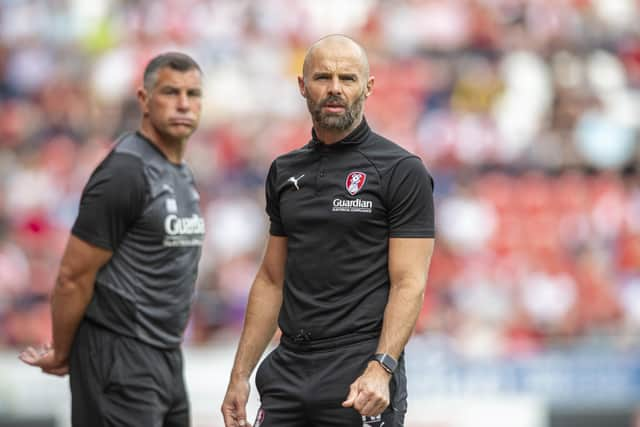Rotherham United: Richie Barker helping Paul Warne to tackle Millers’ workload
Rotherham United’s eloquent assistant manager is just that, a vital part of Paul Warne’s team, not the window-dressing to a footballing dictator. Warne greatly values his insight into the Millers, so we should too.
As the game becomes faster and more physical, so a deep squad increases in importance. Mickel Miller’s three-match ban might be over but a hamstring injury threatens his involvement at home to Crewe Alexandra in League One tomorrow. Shane Ferguson is expected to return from a foot injury but they hope Freddie Ladapo can too.
Advertisement
Hide AdAdvertisement
Hide AdIn a 46-game league season, it has always been virtually impossible for players to perform at full pelt and on top of their game, but now the culture is to freshen up teams rather than tolerate it.


And if at times it is a slog for the players – and no matter how much they love the game or how much they are paid, it can be – the demands on coaches are greater. The miles they put in are in their cars, not on the pitch, and the hours brutal, more so for someone like Barker whose family is based in Brighton.
There were times when last season’s Championship relegation battle seemed to wear Warne down and you would be amazed if it had not, so for Barker to chip in by taking the odd press conference makes perfect sense.
“It’s really tough,” says Barker, who managed Bury, Crawley Town and Portsmouth before going down the assistant’s route. “It’s a seven-day-a-week job.
Advertisement
Hide AdAdvertisement
Hide Ad“Some days are easier than others. Some lead to really late evenings, some just lead to communicating late at night.
“I was fortunate enough to get a couple of days (off) this week, however I was travelling home from Crewe at 20 past 11 on Tuesday night and the manager was probably answering his phone at 10 o’clock. It shouldn’t make a difference but it does that we’re getting to the time where the weather starts changing and darker nights.
“It is important we try and keep ourselves as fresh as we can.
“I remember taking my first role as a manager. I was only 36 and I’d only been retired from playing for two years. I had a skeleton staff of four including myself so I was the coach, manager, sports scientist, scout, director of football, head of recruitment, everything and it was tough going for a young person learning the job.
Advertisement
Hide AdAdvertisement
Hide Ad“We have a lot more staff but it’s also the manager’s job to manage those people. It doesn’t make it any easier.”
Likewise, as the game has become more about squads than teams, resting is unavoidable.
“It’s become a little bit more of a buzzword from the Premier League,” admits Barker. “Some people take it better than others. Some people genuinely do see it that they’re losing their place in the team and might not get it back. However, most of them after you’ve told them will admit they do feel a little bit tired and it’s probably the right thing.
“When I played teams would go through the whole season and probably pick the same XI for a month or something and wouldn’t even consider getting rested. However, the physical outputs are a lot greater, the game’s a lot faster than even 10 years ago.
Advertisement
Hide AdAdvertisement
Hide Ad“Sometimes you just need a mental break. Playing Saturday-Tuesday-Saturday-Tuesday takes a lot out of you in terms of the research you have to do on who you’re playing against and sitting in meetings.
“We expect a large physical output from every player. Ben Wiles, Jamie Lindsay, Ollie Rathbone are 11, 12, 12.5km runners, Chieo (Ogbene) might be less but higher speeds. Those players just can’t sustain it and if they do, their physical performance drops, they end up injured or just have no effect on the game. The demands we put on them can’t be repeated three times in a week.
“If you have the same three (central midfield) players playing week in, week out, there is no competition. As human beings, performance levels drop.
“Also, it’s about options – do we need three players who do this, or one that does something different? Sometimes we might play with two sitters and a 10 so it’s about being able to react to different situations during games but also before games.
Advertisement
Hide AdAdvertisement
Hide Ad“And there’s no getting away from it, people will get injuries.”
Even Barker explaining how Warne decides who to rest underlines what a squad game it is off the pitch.
“Some of it’s stats, some of it’s instinct, but it’s listening to other people’s opinions as well,” he says. “Myself, Warney, Hammy (first-team coach Matt Hamshaw) and (goalkeeping coach) Andy Warrington bounce ideas off each other and it can be any one of the four of us who say, ‘I’m not sure he is ready.’ Then we get the data.
“But whatever the manager decides, we all back him 100 per cent. His name’s above the door.”
Comment Guidelines
National World encourages reader discussion on our stories. User feedback, insights and back-and-forth exchanges add a rich layer of context to reporting. Please review our Community Guidelines before commenting.